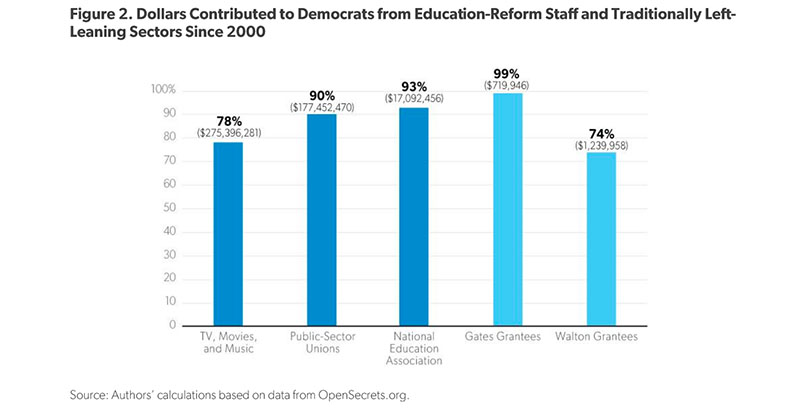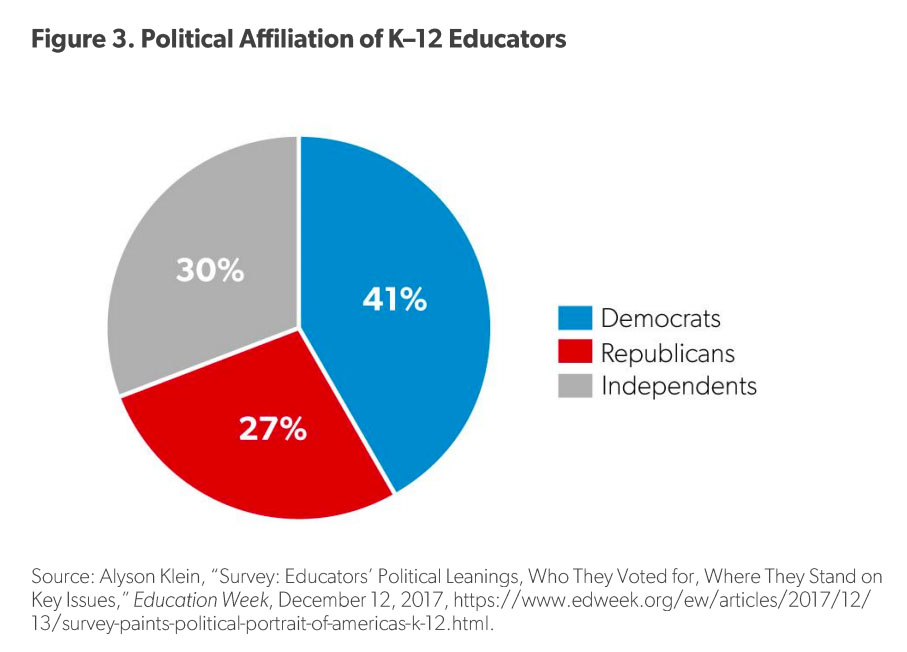Author of Report on Ed Reform’s Blue Hue Pushes Back Against Critics: ‘It Doesn’t Really Matter Who Is to Blame for How We Got Here’

Updated March 12
It should perhaps come as no surprise that a debate about a supposed echo chamber — a report painting the education reform movement as almost exclusively left-leaning, the pushback, and the pushback to the pushback — is ricocheting through a predictable corner of cyberspace.
Critics of a report published Monday on EducationNext.org decrying Education Reform’s Deep Blue Hue are missing the point, says one of the authors, by ascribing blame for what he calls the sector’s “lopsided political makeup.” The issue, the author says, is how a lack of ideological diversity has crippled the movement’s chances of success.
“It doesn’t really matter who is to blame for how we got here,” Jay P. Greene, chair of the University of Arkansas Department of Education Reform, told The 74. “The point is, we’re here. Whatever the cause is, it’s a problem to lack bipartisanship.”
Together with the American Enterprise Institute’s Frederick Hess, Greene tallied campaign contributions made by employees of organizations funded by the two largest backers of education reform efforts, the Walton Family Foundation and the Bill & Melinda Gates Foundation. They found that 87 percent of donations by employees of Walton grantees were made to Democrats, as were more than 99 percent of contributions by Gates recipients.
This makes education reform proponents stronger supporters of Democrats than deep blue strongholds like Hollywood and public-sector unions. The data also show that the Gates grantees and education scholars canvassed are more consistently Democratic than teachers, the authors said. While 93 percent of National Education Association PAC contributions went to Democrats, just 41 percent of teachers surveyed by Education Week in 2017 identified as Democrats.

“The bottom line: The leading participants in the school-reform ‘wars’ are mostly engaged in an intramural brawl,” Greene and Hess wrote, “one between union-allied Democrats and a strand of progressive Democrats more intent on changing school systems.”
The researchers also looked at political spending by the 749 scholars who presented at the most recent conference of the Association for Education Finance and Policy, whose members are thought to be more “hospitable to analysis and discussion of reform,” the two wrote. Only 4 percent of presenters made donations to Republicans, they found. Most of the donations tallied were made during the last decade.
“Incredible piece of data,” tweeted Robert Pondiscio, a senior fellow at the Fordham Institute: @jaypgreene and @rickhess99 looked at political campaign contributions from the staff of Gates grantees in ed reform. “Only eight (that’s eight, not 8%) of the 2,625 campaign contributions went to Republicans.” https://www.wsj.com/articles/democrats-have-taken-over-education-reform-11552002719 …@WSJOpinion
https://twitter.com/rpondiscio/status/1104003380488388609
Despite “omnipresent tropes” casting Gates, Walton, and anyone affiliated as “right-wingers bent on undermining public education,” Greene and Hess wrote, the two organizations might be advised to reconsider their grantee mixes: “An open question is whether foundation giving has helped fuel reform’s partisan tilt or is a reflection of it. The answer may shed light on the dynamics of educational philanthropy and, perhaps, on why so many of its efforts have encountered rough sailing.”
Greene also questioned whether the philanthropists whose money underwrites the grantmaking are ignorant of the politics of the groups they support or whether their foundations are staffed by people who may not share their funders’ beliefs. A spot check by The 74 of political contributions by people who work for the two foundations suggests their donations also lean Democratic, if not so dramatically as the grantees’ spending.
For their part, critics weren’t ready to concede that the sector is politically homogeneous — much less that conservatives have been pushed to its margins. They pointed to everything from turmoil in the Republican Party to the likely demographics of the sample, which included large numbers of people who have chosen to work in high-poverty schools.
Andy Rotherham, co-founder of Bellwether Education Partners and a member of The 74’s board of directors, was among those pushing back, replying to Pondiscio that political spending isn’t necessarily a reliable predictor of political beliefs.
University of Southern California professor Morgan Polikoff, while criticizing the lack of ideological diversity — particularly in colleges of education — also took to Twitter to suggest GOP turmoil is the larger issue.
https://twitter.com/mpolikoff/status/1104029947612426242
Others heard a continuation of complaints leveled by conservative reformers over the past couple of years that they have been pushed out for their failure to co-sign progressive positions on issues such as immigration, school discipline, transgender rights, and those raised by Black Lives Matter.
Among them was DropOut Nation writer RiShawn Biddle:
“The problem has less to do with NEA and [the American Federation of Teachers] and more to do with how advocates for choice, along with nearly all conservative reformers, have consistently failed to work closely with activists — especially BLM advocates and school discipline reformers — on issues outside of ed.”
Coming at the same point of friction but from the opposite stance, Greene opined that it is harder to find agreement on multiple issues. “I think the challenge there has been the introduction of intersectionality into education reform,” he said. “Single-issue movements are more effective, because they require agreement on a single issue.”
Peter Cunningham, who was assistant secretary for communications and outreach in the U.S. Department of Education during the Obama administration, went a step further, saying Republicans have veered away from the issue.
“Conservatives have abandoned education reform in a big way,” he said. “This is a political party that openly wants to get rid of the Department of Education. That underfunds education so deeply it has sparked revolutions of teachers all over the country. They’ve run from accountability — especially when accountability exposed problems with the choice sector.”
Greene disagreed: “If you can’t get the bulk of the Democrats, and you don’t reach out to the Republicans, how can you win?”
Disclosure: The Bill & Melinda Gates Foundation and the Walton Family Foundation provide financial support to The 74. The 74 was among the organizations referenced in the report.
Get stories like these delivered straight to your inbox. Sign up for The 74 Newsletter

;)
